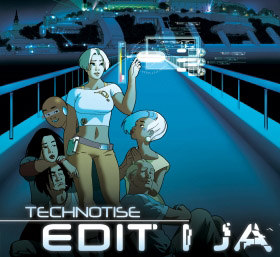Comic book artist imagines futuristic Serbia
 Belgrade - The first Serbian animated movie, Edit i ja (Edith and Me), became an instant hit last month among local fans of comic books and science fiction, drawing in filmgoers with futuristic images of Belgrade and the city's unique slang and humour.
Belgrade - The first Serbian animated movie, Edit i ja (Edith and Me), became an instant hit last month among local fans of comic books and science fiction, drawing in filmgoers with futuristic images of Belgrade and the city's unique slang and humour.
The movie, directed by Aleksa Gajic, was inspired by his comic book Technotise.
"What I loved about this movie is that it is a cartoon for adults. It's complex, dealing with philosophical issues about life, but it's also funny and has a Belgrade feeling to it," one viewer, a college student named Jelena, told the German Press Agency dpa.
The film is set in 2074, when Edith, the main character and a typical Belgrade University student, inserts an electronic chip into her arm so she can pass an exam.
But the chip makes a mess of Edith's body, and the student begins having conversations with an elderly man called Edi, whom no one else can see.
Edith embarks on an effort to save an autistic scientist named Abel. Abel has a formula for bringing peace to mankind, but evil businessmen want to use him for more profitable - and sinister - purposes.
"I did not want to do a story on New York. It was much easier and more interesting to do a movie about something I know, and that is Belgrade," Gajic told dpa.
It took Gajic and his team of friends and colleagues two and a half years to finish the movie. Funding came from Serbia's Ministry of Culture, Belgrade's City Hall, Gajic himself and a commercial sponsor.
Though Edith and Me has won over fans of Gajic's books, it is not as successful as many local movies.
Two recent Serbian films, Cekaj me ja sigurno necu doci (Wait for Me and I will Certainly Not Come) and Djavolja varos (Devil's Town) have attracted bigger audiences, even though they deal with grim aspects of contemporary Serbian society.
Edith and Me is based on characters from Technotise, but it has an original story and is more elaborately drawn than the book.
Technotise is about the adventures of Belgrade teens in a not-so-distant future. It is illustrated in Gajic's characteristic style - a mixture of francophone comics and Japanese manga.
Technotise became a hit among comic book lovers when it was published in the late 1990s, and it served as Gajic's ticket to working in France. There he established a successful career at the publishing house Soleil.
Gajic, who says he was drawing before he could write, describes Technotise as his "first serious" comic book. He collaborated on it in 1998 with the writer Darko Grkinic, who also worked on Edith.
"It was my graduation work at the Faculty of Applied Arts in Belgrade. It was serious enough for me to go to France with it and begin my professional career."
Technotise was also a breath of fresh air on the Serbian comic book scene, which had deteriorated after the break-up of Yugoslavia in the 1990s and the sanctions that followed in Serbia.
Back then, poor-quality pirated copies of comics by Hermann, Jodorowsky, Hugo Pratt and Milo Manara were available, but there was almost nothing new or original from local artists.
In those days, alienated and ambitious Serbian comic book artists went abroad, to France mainly, where they found success. But they won little attention in their home country.
The situation hasn't changed much today, with very little money or support coming from the Serbian state and where an average reader with a monthly salary of 400 dollars cannot afford a comic book that costs some 30 dollars.
"Serbian comics are on life support," Gajic said.
Having achieved recognition as a comic book author, Gajic decided to try his hand at movies. "I always believed there is a story I could tell, so when the French refused to help me make the movie, I returned to Belgrade and began working on Edith."
Gajic said that getting financing for movies in Serbia is also difficult, posing an almost insurmountable obstacle to would-be filmmakers. He wanted to do a sequel to Edith, but instead he will return to comic books.
But whatever Gajic does or wherever he goes, he will still have a solid fan base in Serbia.
"What I like about him is the determination and the guts. There are millions of talented people, but he was the rare one who said, 'No, I'm not going to sell out. I'm not going to stop drawing and get an office job,' and he succeeded, Vladana Jankovic, an art historian, told dpa. "He is living something he loves and I truly admire him for it." (dpa)